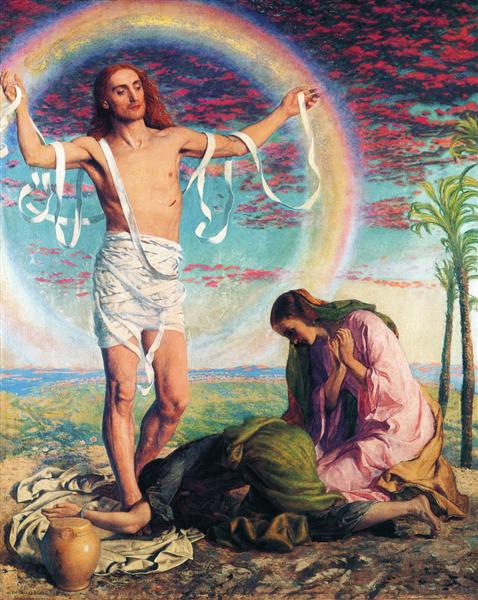Description
William Holman Hunt's Christ and the Two Marys, completed in 1854, is a prominent example of the Pre-Raphaelite movement, whose aesthetics and ambitions are marked by a desire to return to the sincerity and intensity of the early stages of Renaissance art. Hunt, one of the founders of this brotherhood, infuses this piece with vibrant symbolism and a high level of detail that are explored with a notable emphasis on light and color.
In this painting, the viewer finds himself in the presence of a moment charged with emotion and meaning, depicting the resurrected Christ in interaction with two female figures who are identified as Mary Magdalene and another Mary. The use of a triangular composition achieves a visual balance that highlights the connection between the three figures; Christ, in the center, radiates an almost supernatural light that not only defines his figure but also illuminates the two Marys, suggesting their central role in the Christian resurrection narrative.
The faces of the two Marys are exquisitely delicate, filled with emotion and wonder, reinforcing the intimacy of the moment. Mary Magdalene's almost hypnotized gaze, coupled with the other Mary's reverent expression, intensifies the human and spiritual bond that Hunt seeks to portray. The painter captures not only the biblical scene, but also a profound emotional experience that resonates through time.
The colour palette used by Hunt in this work is rich and vibrant, a notable characteristic of his style. The tones of the Marys' dresses are varied, displaying shades of red, blue and green, which not only add to the visual dazzling quality, but also contribute to the narrative, as each colour can be interpreted as a symbol of different virtues and emotions. The deep dark background contrasts with the luminosity of the figures, drawing the viewer's immediate attention to the dynamic triangle formed by Christ and the Marys.
A fascinating detail of this painting is the inclusion of symbolic elements in the surroundings. For example, the flowers in the foreground are not mere decorations, but evoke diverse meanings, from love to purity, reflecting the connection of the divine and the human. Hunt, known for his meticulous attention to detail, employs nature as an extension of the human narrative, where each element becomes a symbol that enriches the understanding of the work.
The pictorial background is charged with symbolism, representing both the Jewish context of the scene and the universality of the message of Christianity. The combination of natural elements native to Palestine, together with the figure of Christ standing upright, establishes a powerful contrast between the earthly and the heavenly.
In conclusion, "Christ and the Two Marys" is not only a depiction of the momentous moment of the Resurrection, but is also a testament to Hunt's own artistic ethos and the Pre-Raphaelite movement as a whole. Through careful color choice, composition, and symbolism, Hunt creates a work that continues to resonate with the contemporary viewer, inviting reflection and contemplation of the deeper meaning of such moments of faith. His ability to capture the ethereal in the physical marks this painting as an enduring landmark within the canon of religious art and a clear example of Pre-Raphaelite virtuosity.
KUADROS ©, a famous painting on your wall.
Hand-made oil painting reproductions, with the quality of professional artists and the distinctive seal of KUADROS ©.
Painting reproduction service with satisfaction guarantee. If you are not completely satisfied with the replica of your painting, we will refund 100% of your money.

